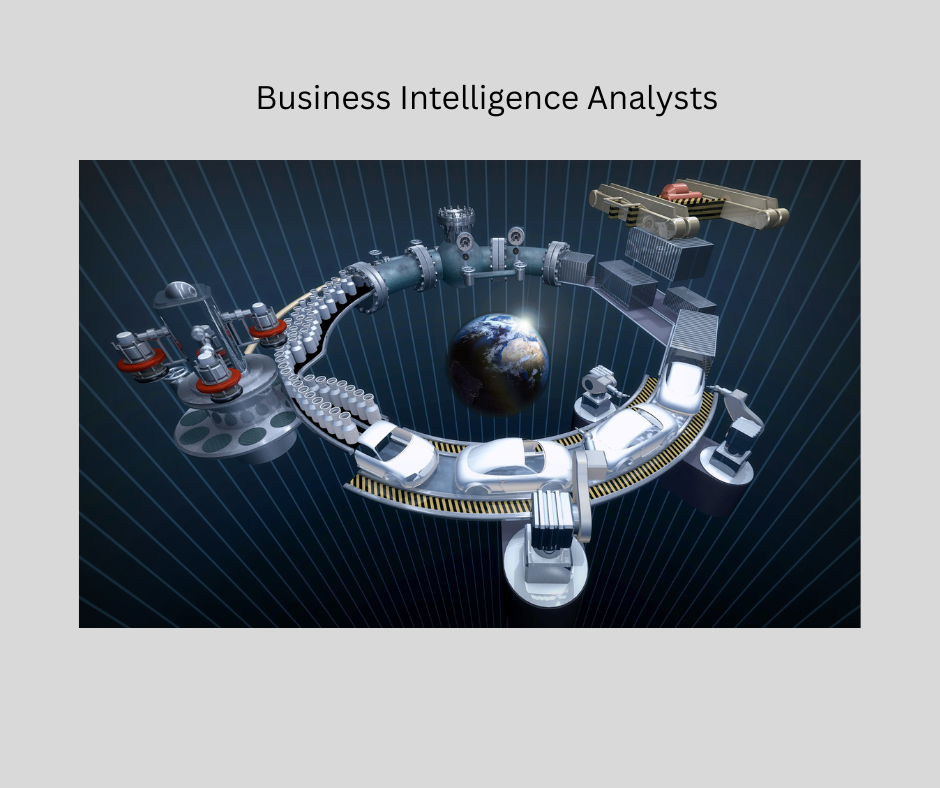Business Intelligence Analysts: Transforming Data into Strategic Decisions
Introduction: Why Data Matters Today
These days, businesses get huge amounts of data from everywhere—customers, the market, social media, websites, and more. But just having data isn’t enough. What matters is how we use it. That’s where Business Intelligence (BI) Analysts come in. They help companies make sense of this data and use it to make smart decisions that improve performance and profits.
Who is a Business Intelligence Analyst?
A Business Intelligence Analyst is someone who understands both data and business. They use software tools to turn raw data into useful information. Their job is to help companies understand what’s working, what’s not, and what can be improved.
Main Responsibilities:
- Analyze business data and performance.
- Create dashboards and charts to show important numbers.
- Work with different teams to understand what data they need.
- Use tools like Power BI, Tableau, and SQL to create reports.
- Give useful suggestions to help the business grow or save money.
Why Business Intelligence is Important
- Smarter Decisions
Leaders can make better decisions based on facts, not guesses. - Stay Ahead of the Competition
Companies can spot new trends and opportunities faster than others. - Save Costs
Data helps find areas where money is being wasted and improve efficiency. - Track Progress
BI Analysts help monitor company goals using key numbers (KPIs).
Key Skills Needed to Be a BI Analyst
- Understanding Data
You must be able to find patterns and insights in large sets of data. - Tech Knowledge
- SQL: To pull data from databases
- Excel: For organizing and analyzing data
- Power BI / Tableau: For visual reports and dashboards
- Python / R: For more advanced analysis
- Business Understanding
Knowing how different departments work helps you provide better insights. - Communication Skills
You should be able to explain complex data clearly to people who aren’t technical.
Tools Used by BI Analysts
- SQL: To get data from company databases.
- Excel: For calculations and making charts.
- Power BI / Tableau: For creating dashboards and visual reports.
- Python / R: For deep data analysis and automation.
- ETL Tools (like Talend): To clean and prepare data before analysis.
Where BI Analysts Work
BI Analysts are needed in almost every industry:
- Healthcare: Improving patient care and hospital performance.
- Finance: Detecting fraud and helping with smart investments.
- Retail / E-commerce: Understanding customer behavior and managing stock.
- Manufacturing: Improving production and supply chain.
- Education: Tracking student performance and improving teaching methods.
The BI Analyst’s Process: How They Work
- Collect Data from systems, reports, or research.
- Clean the Data to fix errors and organize it.
- Analyze and Report using dashboards and charts.
- Share Insights with managers and teams for better decisions.
Benefits of Having a BI Analyst
- Faster and better decision-making
- Reduced costs and waste
- Better understanding of customers
- Real-time tracking of business performance
- Discover new ways to earn money
Challenges BI Analysts Face
- Data might be missing or incorrect
- Data is stored in many places (not connected)
- Some people resist using data to make decisions
- Technology is always changing, so constant learning is needed
The Future of BI Analysts
As technology grows, so does the role of a BI Analyst. Some future trends include:
- AI and Machine Learning: For predictions and smarter insights
- Real-Time Data: Make decisions instantly with live data
- Cloud Tools: Easier sharing and access to data from anywhere
How to Become a BI Analyst
- Education
Get a degree in Computer Science, Business, or a related field. - Certifications
Boost your skills with courses like:
- Microsoft Certified: Data Analyst
- Tableau Desktop Specialist
- Google Data Analytics Certificate
- Get Practical Experience
- Start with internships or beginner-level jobs
- Work on real-world projects or help with open-source data projects
Final Thoughts
In today’s world, Business Intelligence Analysts are the key to helping companies use their data to grow and succeed. They turn numbers into stories, and stories into smart business moves. If you’re interested in a career in data, start learning today. You can join Business Analyst training program in Delhi, Mumbai,Noida and Gurgaon to get the skills you need. It’s a smart career choice with lots of opportunities!

